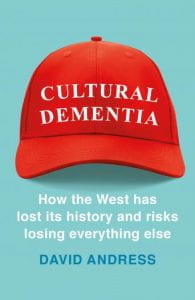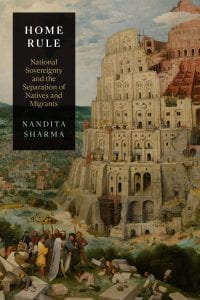By Bridget Anderson
As another shameful deportation charter flight has just left for Jamaica, I wanted to reflect on three books I’ve read recently that connect to this horror in different ways. The first is a short book by David Andress called Cultural Dementia (Apollo 2019). Andress is a historian and as he wrote the book he was dealing with the destruction that Alzheimers was wreaking on his father, so he does not use the term ‘dementia’ lightly. He describes how Europe, and more particularly the UK, France and the USA are experiencing a terrible forgetfulness or at best a half-remembering of the past, resulting in a tremendous disconnect and a deep confusion and misunderstanding about the present.
A self-confessed Remainer, Andress sees the symptoms of cultural dementia in the ways that Brexit calls on a golden age of the welfare state, and a fantasy of a nation state imagined as on the one hand hermetically sealed and on the other dominant and expansionist.
To be frank, I am not sure that the memory of ardent Remainers is particularly sound either, and even the short–term memory of the Greek vote, Portuguese austerity politics and the EU–Turkey deal seems to have vanished in a fantasy of the European Union as a bastion of social democratic redistributive justice. When it comes to the longer term, I would be tempted to diagnose Cultural Lobotomy rather than Cultural Dementia as people’s potential to understand our history has been deliberately excised. Remember Operation Legacy (Sato 2017), the destruction of colonial documents amounting to ‘one of the most spectacular destructions of historical records known in our time’.
And this lobotomy has terrible consequences for all of us including long term British residents born in the UK’s former colonies, the so-called ‘Windrush generation’. Earlier this week, Home Office Minister Kevin Foster, claimed that ‘The Windrush generation should be defined by the midwife who delivered hundreds of babies, the person who travelled thousands of miles to work hard and provide for their family for decades’ (PoliticsHome, 10/2/20). This was a matter, he told the House of Commons, of ‘criminality not nationality’.
Cultural lobotomy wreaks havoc with one’s sense of justice, ignoring the fact that Jamaica was an English colony from 1655, that is BEFORE England’s Act of Union with Scotland. Yet it was not the fact that the Windrush generation had come to the UK as subjects and citizens, residents of islands which Britain had ruled as an imperial power, materially connected through slavery, expropriation and primitive accumulation, that gives them rights, but rather, to use then Prime Minister Theresa May’s phrase ‘they have made a contribution’. Despite these connections in the past and the present, rights associated with membership are framed as deserved, rather than assumed.
There are cures for cultural dementia that help us unpack the relationship between racism and hostility to migrants, and relatedly between the politics of race and the politics of migration. There are some fantastic scholars who have been arguing this for a while – people like Gargi Bhattacharya, Alana Lentin, Luke de Noronha and Nira Yuval Davis. But frustratingly little attention has so far been paid to the role of ‘nationality’.
Nationality can be read as both a legal status, consonant with citizenship, AND as signifying belonging to the nation of the nation state. Nationality in both legal and social senses is traced through ancestry and in this way, nationality is sutured to ‘race’. This is the key insight of the second book I’ve been reading, Radhika Mongia’s Indian Migration and Empire (Duke University Press 2018). She examines the efforts to control the movement of Indians to Canada in a climate of hostility to ‘Asiatics’ who nevertheless were British subjects. How to stop negatively racialized bodies from entering, without naming race? The answer was through mobilizing nationality via the passport. ‘A blurring of the vocabularies of nationality and race is a founding strategy of the modern nation-state that makes it impossible to inquire into the modern state without attending to its creation in a global context of colonialism and racism’.
It is not simply that migration is wrongly imagined as disturbing a previous national homogeneity, but that migration precipitated the emergence of nationality as a territorial attachment. Thus, migration is not an external challenge to state development and rule but is central to it; and racism is not an unfortunate characteristic of immigration enforcement but is absolutely baked into immigration controls.
And there is a fantastic third book, just out, by Nandita Sharma, called Home Rule (Duke University Press 2019) that you’ll be hearing more about in the next few months. Nandita explores the making and separation of the categories of ‘native’ (people in place) and ‘migrant’ (people out of place). I’m very pleased to say that she will be joining us on a Benjamin Meaker fellowship in May and we are planning a number of events during her stay. Nandita’s work is the antidote to cultural dementia – not only her fantastic scholarship, but also her creative collaborations and political activism. Watch this space for some really interesting upcoming activities…
Bridget Anderson is Professor of Migration, Mobilities and Citizenship and Director of Migration Mobilities Bristol.



